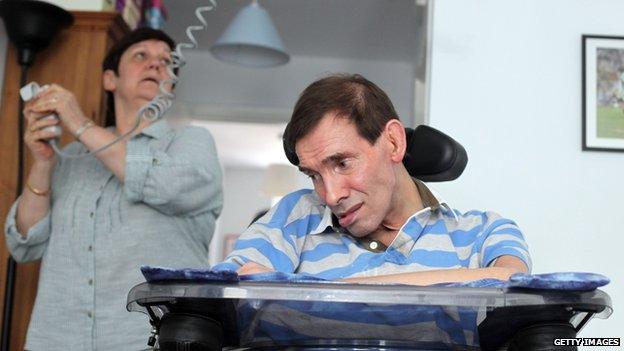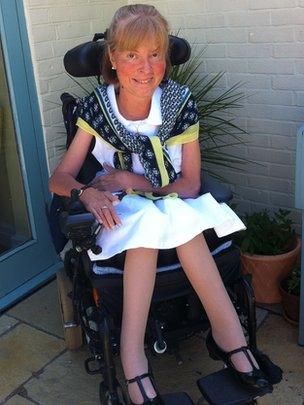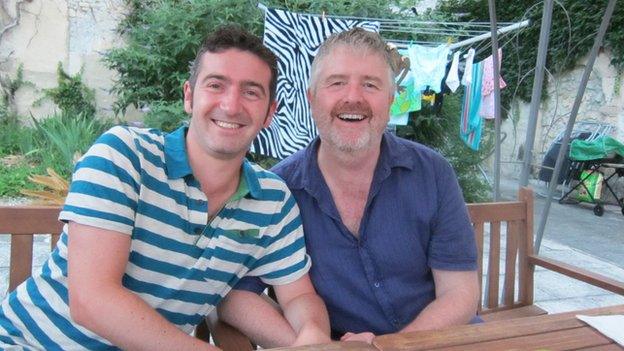Right-to-die: For and against assisted suicide
- Published

The family of locked-in syndrome sufferer Tony Nicklinson launched a legal bid after his death to continue his right-to-die fight
On Wednesday, campaigners lost their latest appeal over the right to die.
The family of the late Tony Nicklinson who had locked-in syndrome and Paul Lamb who was paralysed in a road crash had hoped to change the law so that chronically ill or disabled people could be helped to die with the assistance of a doctor.
So what are the arguments for and against assisted suicide for disabled people?
Baroness Jane Campbell (against) opposes assisted suicide and wants to maintain the status quo. She is a disability rights campaigner and founder of Not Dead Yet UK, a network of disabled people in the UK who oppose the legalised killing of disabled people. John Grantham (for), whose partner Paul Hartland committed suicide while living with motor neurone disease, is in favour of a change in the law. Both explain their opinions below.

Baroness Jane Campbell
Campaigners for a change in the law on assisted suicide present it as an extension of choice, giving those with chronic illness or disability the same "right" to end their lives as the rest of the population. When any other person seeks to end their life, we do not assist them. We help those with suicidal thoughts look for positives in their lives. I believe chronically ill and disabled people deserve that "right", to be helped by us all to live their lives.

As a severely disabled person, I fear a change in the law to permit assisted dying. Those arguing for a change do not offer any guidance as to who might be included or excluded from obtaining assistance. I have suffered illnesses that have brought me close to death and I am sure to do so again. Will the doctors who cared for me so expertly in the past, now be ready to offer an assisted death?
Many disabled people know first-hand how society fears illness and disability. Most people are concerned about being reliant on others for assistance. The media has done a service to us all by exposing neglect and abuse in hospitals and care homes. Such scandals always reveal the receivers of care have been dehumanised by the providers of care. Few would believe that every case of malpractice has been exposed or that abuse cannot also occur when care is provided within the family.
Many have seen loved-ones, particularly parents, become frail as their health deteriorates. The main reason given for wishing to die is not wanting to become a burden, whether their family would see it that way or not. Against this background, the "quick-fix" of an assisted death appears attractive.
It is precisely because that is the majority view that we must continue to oppose it. There is no better evidence of the negativity with which terminal illness, chronic illness, and disability is viewed than that we might be better off dead.
We would not give-up on a suicidal person in otherwise good health, we should not give up on a terminally ill or disabled person seeking an assisted death.

If assisted dying is really a "right" (and I'm convinced it is not), it must be available to all, including the fit and well who consistently say they are suffering intolerably, not just those who find themselves in extremely desperate and challenging circumstances due to their deteriorating health. I didn't want Tony Nicklinson to die and I don't want Paul Lamb to die. I respect and value them. I want them to carry on disagreeing with me for as long as possible.

John Grantham
My partner, Paul, ended his life in March 2013. He was 35 years old and was suffering from motor neurone disease.
Paul would have preferred to have lived longer and opted for assisted suicide further down the road. Sadly that was not an opportunity available to him. From shortly after his diagnosis Paul became terrified of being trapped inside a non-functioning body and made it very clear that he would refuse medical treatment to assist him breathing when that time came.

John Grantham's partner Paul (left) bought drugs online which he used to commit suicide
We initially discussed travelling to Dignitas; Paul joined the organisation and started donating money to them. However he didn't want to die in a strange environment and neither did he want me to be implicated in his death.
Paul committed suicide while he was still physically able. He was weeks if not days away from being unable to feed himself. I helped him to the lavatory and did everything for him but feeding himself was important because it meant he could still administer a fatal dose orally; which is what he did. He had bought drugs online from China which cost an extortionate amount of money. He deserved a better end.
I never got to say goodbye to him. He died alone and, of necessity, he never got to say things to me, his parents or friends, which I know he would have wanted to say.
It is important to note that at the time of his death there was much that he was still enjoying. He did not take his life because he was depressed. His options were to kill himself whilst he still could or to endure months, possibly years trapped inside his body. The only other option would have been to plead with his loved ones to end his suffering when he could no longer do so which, of course, he rejected.
He always said the greatest burden was knowing he had to end his own life and getting the timing right. If assisted suicide had been available I have no doubt Paul would have waited longer. Who knows, he may have allowed more medical help if he could have chosen to go when he was no longer taking pleasure from living.
Paul's body failed him but his mental powers never did. He did not want other people making decisions for him and, at the point when he could no longer move, be told his opinion and wishes are effectively irrelevant.
Assisted suicide is not about ending lives early, it is about giving people choices and I believe in many cases people would live longer and enjoy life more if they knew that their wishes could be fulfilled when no longer physically able.

Lord Falconer's Bill on assisted dying, external is scheduled for debate in the House of Lords in the next three weeks. It differs from assisted suicide as it is not about stopping ongoing illness or disability with which you can live. His bill applies to terminally ill, mentally competent adults. It also requires the dying patient, after meeting strict legal safeguards, to self administer life-ending medication.
For some disabled campaigners this would be a step towards the "slippery slope" which lessens the value of life. For others however this would enable people to have choice and control over the dying process when their death is imminent.
Follow @BBCOuch, external on Twitter and on Facebook, external, and listen to our monthly talk show